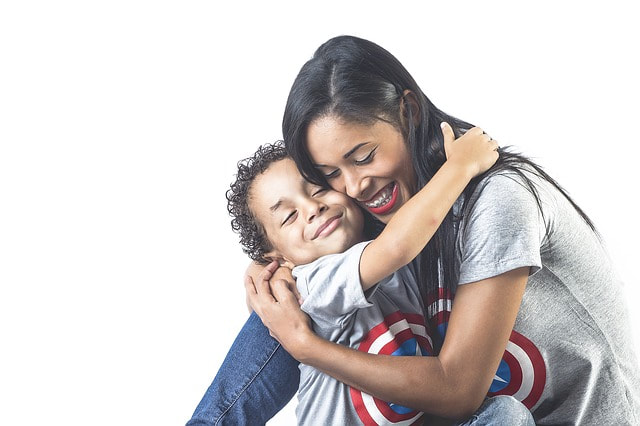 Love. Family. Relationships. How do you feel most connected to your child? Is it from a hug, a special dinner made for you, a small gift, or a compliment? The language of love can seem so simple to express, yet can go unnoticed from those around you. Parents deeply love their children but schedules are busy and sometimes the day goes by and we haven’t connected to our little loved ones. Life events change the family schedule and can impact the amount of time you have to spend together. Maybe you went from working part-time to full-time, or you are going through a divorce, or there is an illness in the family. These changes impact the way you interact and spend time with your child. You are tired when you come home, you have more things to fit in before bedtime and there is a feeling of being emotionally depleted. Over the course of months your children will notice and feel the difference. A book written by Gary Chapman, PH.D and Ross Campbell MD called “The Five Love Languages of Children” emphasizes understanding your child’s love language and then nurturing it to fill their “emotional tank”. The authors discuss that there are five love languages that children and adults need nurtured in order to be confident and stable emotionally. The following is a list of the five love languages and activities you can do to help your children have a full “emotional tank” so that they can thrive. Words of affirmation: Giving your child compliments, or encouraging words that are spoken or written. Leave a note for your child in their lunch box or a note on their mirror. Send a text message or emoji. Say things like “ I love you,” “you’ll do great on your test”, or “your smart”. For the month of February I will take a sticky note and everyday leave a compliment to my child and stick it on their bedroom door. Quality Time: Doing things together with no interruptions, one-on-one time, taking trips, going on walks, being together at home and not being interrupted, playing keep it up with a balloon or one on one conversation in the car. Telling them “I’d like to spend time with you today let’s pick something you want to do”. Television/video games not included. Receiving Gifts: Giving small tokens of a material gift. Giving a sea shell, stone(draw a picture on the stone), a facial expression that shows genuine love, giving time, or remembering a special occasion. Attending an event your child is in or making a desert together. Acts of Service: On going helpfulness, whether chores or fixing something that is important to the child. Helping them with homework, sewing their stuffed animal or fixing flat tire on their bike. You can say things like “What can I do for you?” or “Today, I did… for you.” “Would you like me to try and...” Physical Touch: Facial expressions that are warm and inviting, hugs, high-fives, fist bump, sitting close, and a group hug (the family pet is fun to snuggle, too). Sitting close and reading a book together. A sweet massage with an essential oil. It’s any kind of positive physical contact. The authors discussed that every child and adult has a primary love language that they prefer. However, it’s equally important to continue to give in the other areas too so that the child feels the parent’s heartfelt love. Be curious about which love language would best describe what your child needs and how does that compare to what you give?
15 Comments
2/9/2018 09:55:33 am
This is awesome! I love you how you related this to children. Often times we think love language only applies to adults in intimate relationships. Thanks for this reminder!
Reply
Rose LaPiere
2/12/2018 05:56:32 pm
Yes! thanks for reading.
Reply
2/14/2018 10:54:05 pm
100% agree Kerri-Anne! That's what I was thinking! x
Reply
2/12/2018 03:32:25 pm
This article is timely. Children in this generation is seems to be too sensitive. Sometimes you’ll be surprised on what they say and do. We have to really take some time and understand how our own kid behaves. This is useful so that we’ll know how to communicate with them. Spending quality time is the best language of love for me. We need to be physically present so we can show our love and care to our children. Thank you for this great article!
Reply
Rose LaPiere
2/12/2018 05:55:48 pm
thank you for the feedback.
Reply
2/14/2018 10:38:22 pm
I'd never thought of kids having love languages too!But of course they do. Such an insightful post. Thanks for sharing!
Reply
Rose LaPiere, LPC, RPT-S, ACS
2/28/2018 09:38:37 pm
Thanks Amber
Reply
2/14/2018 10:57:08 pm
Love this! From my work with families in my area, the acts of service and gifts seem to be high but the quality time, words of encouragement and positive touch is often MIA. Tweaking these things makes such a big difference to the relationship and the self esteem of the child. Thanks for your article :) x
Reply
Rose LaPiere, LPC, RPT-S, ACS
2/28/2018 09:39:18 pm
Thanks Rachel
Reply
2/27/2018 09:25:16 am
If only all parents will consider HOW their children feel most loved!
Reply
Rose LaPiere, LPC, RPT-S, ACS
2/28/2018 09:40:13 pm
So true!
Reply
2/27/2018 02:24:53 pm
What a great way to explain the love languages of children. Thank you for sharing.
Reply
Rose LaPiere, LPC, RPT-S, ACS
2/28/2018 09:40:42 pm
Thanks Kim!
Reply
Rose LaPiere, LPC, RPT-S, ACS
2/28/2018 09:41:14 pm
Thanks Laura
Reply
Your comment will be posted after it is approved.
Leave a Reply. |
AuthorROSE LAPIERE, LPC, RPT-S, ACS Archives
March 2020
Categories |


 RSS Feed
RSS Feed